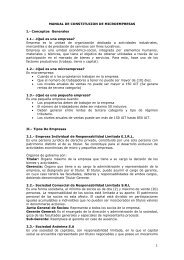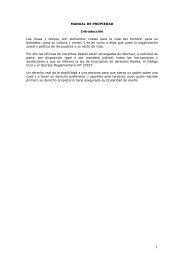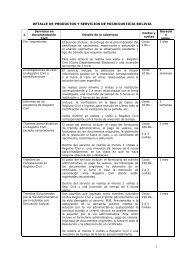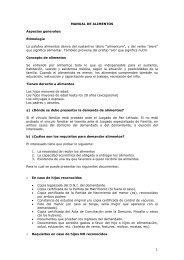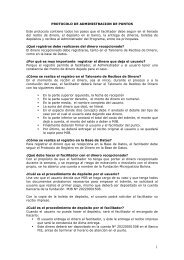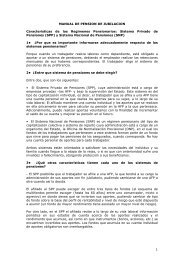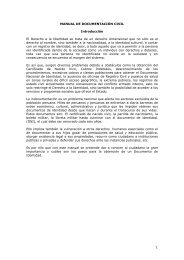ICISS report - International Coalition for the Responsibility to Protect
ICISS report - International Coalition for the Responsibility to Protect
ICISS report - International Coalition for the Responsibility to Protect
Create successful ePaper yourself
Turn your PDF publications into a flip-book with our unique Google optimized e-Paper software.
The <strong>Responsibility</strong> <strong>to</strong> <strong>Protect</strong> 37<br />
find such compromises, moni<strong>to</strong>red or brokered by <strong>the</strong> international community, founder<br />
on <strong>the</strong> intransigence of one or both parties, and full-scale violence is in prospect or in<br />
occurrence, can a military option by outside powers be considered.<br />
Proportional Means<br />
4.39 The scale, duration and intensity of <strong>the</strong> planned military intervention should be <strong>the</strong><br />
minimum necessary <strong>to</strong> secure <strong>the</strong> humanitarian objective in question. The means have <strong>to</strong><br />
be commensurate with <strong>the</strong> ends, and in line with <strong>the</strong> magnitude of <strong>the</strong> original provocation.<br />
The effect on <strong>the</strong> political system of <strong>the</strong> country targeted should be limited, again, <strong>to</strong> what<br />
is strictly necessary <strong>to</strong> accomplish <strong>the</strong> purpose of <strong>the</strong> intervention. While it may be a matter<br />
<strong>for</strong> argument in each case what are <strong>the</strong> precise practical implications of <strong>the</strong>se strictures, <strong>the</strong><br />
principles involved are clear enough.<br />
4.40 It should go without saying that all <strong>the</strong> rules of international humanitarian law should<br />
be strictly observed in <strong>the</strong>se situations. Indeed, since military intervention involves a <strong>for</strong>m of<br />
military action significantly more narrowly focused and targeted than all out warfighting, an<br />
argument can be made that even higher standards should apply in <strong>the</strong>se cases.<br />
Reasonable Prospects<br />
4.41 Military action can only be justified if it stands a reasonable chance of success, that is,<br />
halting or averting <strong>the</strong> atrocities or suffering that triggered <strong>the</strong> intervention in <strong>the</strong> first place.<br />
Military intervention is not justified if actual protection cannot be achieved, or if <strong>the</strong> consequences<br />
of embarking upon <strong>the</strong> intervention are likely <strong>to</strong> be worse than if <strong>the</strong>re is no<br />
action at all. In particular, a military action <strong>for</strong> limited human protection purposes cannot<br />
be justified if in <strong>the</strong> process it triggers a larger conflict. It will be <strong>the</strong> case that some human<br />
beings simply cannot be rescued except at unacceptable cost – perhaps of a larger regional<br />
conflagration, involving major military powers. In such cases, however painful <strong>the</strong> reality,<br />
coercive military action is no longer justified.<br />
4.42 Application of this precautionary principle would on purely utilitarian grounds be<br />
likely <strong>to</strong> preclude military action against any one of <strong>the</strong> five permanent members of <strong>the</strong><br />
Security Council even if all <strong>the</strong> o<strong>the</strong>r conditions <strong>for</strong> intervention described here were met.<br />
It is difficult <strong>to</strong> imagine a major conflict being avoided, or success in <strong>the</strong> original objective<br />
being achieved, if such action were mounted against any of <strong>the</strong>m. The same is true of o<strong>the</strong>r<br />
major powers who are not permanent members of Security Council. This raises again <strong>the</strong><br />
question of double standards – but <strong>the</strong> Commission’s position here, as elsewhere, is simply<br />
this: <strong>the</strong> reality that interventions may not be able <strong>to</strong> be mounted in every case where <strong>the</strong>re<br />
is justification <strong>for</strong> doing so, is no reason <strong>for</strong> <strong>the</strong>m not <strong>to</strong> be mounted in any case.<br />
4.43 In relation <strong>to</strong> <strong>the</strong> major powers, <strong>the</strong>re are still o<strong>the</strong>r types of pressure that can be<br />
applied, as happened, <strong>for</strong> example, in <strong>the</strong> case of Indonesia and East Timor. And o<strong>the</strong>r types<br />
of collective action – including sanctions – could and should still be considered in such<br />
cases as part of <strong>the</strong> responsibility <strong>to</strong> protect.



